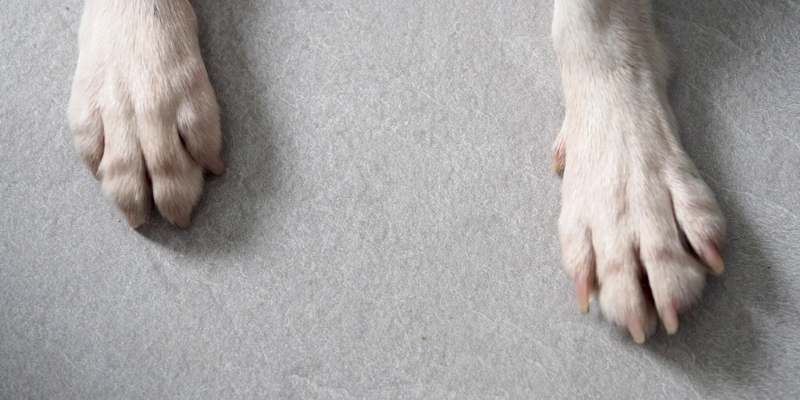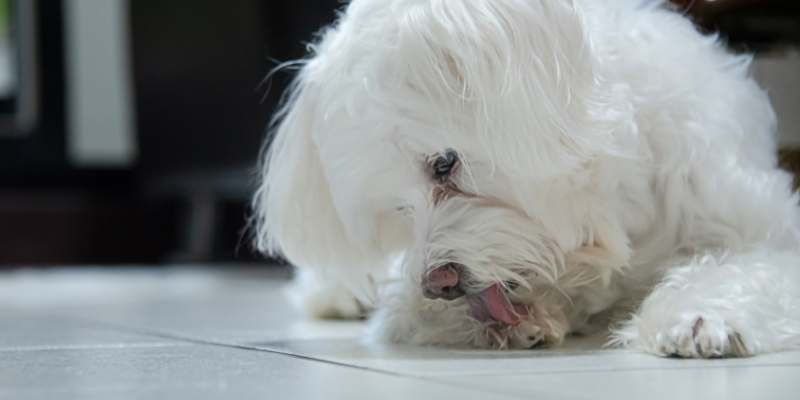Dogs lick or chew their paws for various reasons, as with other canine activities. Examples are injuries, skin disorders, environmental, parasites, food allergies, and boredom or anxiety.
Paw licking is a common part of the grooming process for dogs, especially when they come inside after walking on dusty or sandy ground. However, if your dog licks his paws regularly and intensely, you should suspect something amiss. So, what exactly does it signify when your dog licks its paws? And how do you stop it (if necessary)?
Do you have a specific question about the reasons why your dog is licking paws? Then use the table of contents below to jump to the most relevant section. And you can always go back by clicking on the black arrow in the right bottom corner of the page. Also, please note that some of the links in this article may be affiliate links. For more details, check the Disclosure section at the bottom of the page.
Here's what we'll cover:
Why is my dog licking his paws: main reasons
Normal grooming
Even though your dog enjoys splashing in puddles or rolling in mud, most dogs prefer to be clean and will groom themselves. If you see your dog occasionally licking and chewing on its paws, it is most likely a typical grooming habit. If your dog is constantly licking their paws or licking them till the paws are red and sore, there is obviously something else going on that needs to be looked at.
Injuries

The first step is to examine the paws to ensure there is no injury, such as a cut, ripped nail, growth, or a stone, thorn, or ice ball caught between the pads. Especially if the licking starts suddenly and is centered on one paw. Examine the nails, the spaces between the toes and pads, and the tops of the feet carefully.
Your dog’s paw could have been inflamed by stepping on something sharp, walking on salty or hot pavements, getting stung by a bee, or developing a blister. Some of these issues can be resolved with simple first aid, while others may necessitate veterinary care.
Food allergies
Many dogs suffer from food allergies, which differ from food sensitivities and can cause severe itching. Allergies develop when your dog’s immune system reacts inappropriately to something they ate. Proteins such as beef and chicken, dairy, eggs, and wheat are some of the most common causes of food allergies. Food allergies might be challenging to detect, but they can cause various symptoms over time, including paw licking, vomiting, diarrhea, and skin rashes.
If you detect these symptoms in your dog, make an appointment with your veterinarian and ask for an allergy test. Your veterinarian may recommend a customized diet for your pet or advise you to avoid pet foods containing certain substances. Grain-free dog food and limited ingredient diet dog food are available at Petco.
Parasites
Infections such as fleas or mange can make the paws extremely itchy. Your veterinarian might offer parasite-removal therapies, which should alleviate itching.
Skin dryness
Allergies, dry weather with low humidity, and over-bathing can all cause your pet’s skin to become sensitive, flaky, and itchy. In addition, dandruff in your dog’s fur is an indication that his skin is splitting and flaking. Bathe your dog sparingly, as regular bathing will deplete your dog’s coat of natural oils.
Learn more about pet skin issues to keep your dog’s skin and coat soft and shiny. For example, you may be able to stop your pet’s paw licking by mending their dry skin.
Pain
Finally, a dog in pain from arthritis or other foot or leg disorders may lick his paws. Even if the pain is elsewhere in their body, some dogs will try to cope by licking their front paw continuously. A veterinarian must diagnose and treat this condition.
Obsessive and anxious behavior
Dr. Flynn advises that any medical disorders be ruled out before looking into behavioral issues. In times of stress, dogs, like humans, seek ways to calm themselves. “This habit can be a sort of self-soothing for pain or, in certain situations, anxiety,” Dr. Flynn explains. Is there a change in your dog’s environment (noises, routine, new pets, or humans) that could encourage him to seek this type of stress relief? In addition to stress, some canines suffer from the canine compulsive disorder, a type of OCD. Paw licking, toy/blanket sucking, tail licking, and tail chasing are all common compulsive behaviors in dogs with CCD. Determine the sources of your dog’s tense and nervous behavior and use redirection and exercise to alleviate it.
Flakes and dandruff
Flakes in a dog’s fur may suggest dry skin, occurring in certain areas or seasons.
Moisturizing cream rinses for dogs and additional omega-3 oil may help relieve irritation from dry skin.
Blisters
Blisters can form in places where there is contact, such as between the toes. They might be painful, causing the dog to lick its paws.
Oral antibiotics, which can be given by your veterinarian, may be required for complete healing.
Arthritis

“When we notice licking, one of the first things we want to rule out is arthritis of the paw or foot joints. The dog may be experiencing discomfort or tenderness in the affected area and licks it to find relief. If you detect a behavioral change in your dog, you should always take it to the doctor so that any other health issues can be ruled out.
Toenail injuries
If your dog keeps licking one paw, he or she may have an injured toenail or a partially ripped nail. If your foot gets caught in grass, cloth, or carpet, this can happen. There is frequently bleeding from the dog’s nails and swelling and discomfort in the dog’s paws.
When the torn piece is properly removed, the toe will improve. Infection and inflammation medications can also be beneficial. Consult your veterinarian for assistance in removing the torn portion of the nail and drugs.
Yeast
When yeast is allowed to overgrow, it contributes to itching, odor, and an overall greasy feel to the skin.
Use medicated dog shampoos and dog wipes mixed with an antifungal to help manage yeast on the skin to treat a yeast infection in a dog’s paws.
Dermatitis
Suppose the paw pads and feet are normal. In that case, the licking could be caused by a skin ailment (dermatitis or pododermatitis), which is frequently caused by bacterial issues, allergies, or dietary sensitivities.
Your dog may get dermatitis if he or she is allergic to chemicals in your yard, deicing agents, or specific types of grass or weeds. Keeping a dish of water and a towel near the door to gently clean the paws when you come inside may be beneficial.
Parasites, fungus, and bacteria
Many dogs like meeting new people in the neighborhood or at the dog park, but some undesirable visitors may get onto your dog’s body. Itchy paws and chewing on your dog’s paws could suggest the presence of parasites such as fleas or mange. Some dogs are susceptible to flea saliva, which can cause intense itching. If you detect fur loss, red skin, or hot patches on your dog’s body, it’s time to consult a veterinarian.
Your dog licking their paws excessively could potentially suggest a bacterial infection that requires antibiotics. Importantly, paws that are constantly licked may become infected with yeast. Antifungal medicine can treat yeast infections. But make sure your vet checks for other reasons for itchy paws, as yeast infection may be secondary. That suggests your dog may have gotten the yeast infection from licking their paws for another cause.
Petco has a Pet Pharmacy that sells many of the same drugs as your veterinarian.
Flea allergies
Flea allergy dermatitis occurs when a dog’s immune system overreacts to flea saliva (FAD). This allergic reaction produces skin inflammation, resulting in an incredibly itchy sensation for the poor pup. To relieve the irritation of flea allergy, dogs will scratch and lick their paws and rump. Flea allergic dermatitis is characterized by hair loss, thickened skin, redness, and hot areas.
Should I stop my dog from licking his paws?
Don’t disregard the activity if you notice your dog licking their paws excessively. Your dog may be attempting to alert you to a problem. If you can’t detect and fix the problem straight away, make an appointment with your veterinarian to look into additional options. The longer you wait, the worse the underlying problem may become, and your pet may be in pain. Your veterinarian can provide anti-itch medication, steroids to reduce inflammation, and any medications required to treat bacterial, fungal, or parasite infections.
How to stop a dog from licking his paws?
When you discover a paw licking pattern, the following step is to correct the condition and locate a therapy for dogs licking paws. If your pet has a wound causing the paw licking, such as a dog licking paws and limping, first aid is essential to treat the area. The paw licking wound should go away once the area has been treated and healed.
Your veterinarian will test your dog to identify what things are causing your pup to react and lick their paws constantly if they have allergies. Dogs may also lick their paws if they have a yeast infection, which can occur due to a poor diet. Switching to a different pet diet may assist in combating paw licking for this type of condition.
If your dog has gastrointestinal issues, it may lick their paws excessively. Your veterinarian will be able to provide a solution for dogs licking their paws. A hormonal imbalance and fungal or bacterial infections are two other areas where a veterinarian will be required to provide therapy. Medical treatment will be administered to assist minimize or eradicating the problem.
The following conditions can cause paw licking, which can be treated at home in a variety of ways:
Fleas: If your dog’s paw licking is caused by fleas, you can use an over-the-counter flea treatment to kill the fleas and halt the licking.
Anxiety or Boredom: Anxiety or boredom can also cause paw licking. Take your dog for extra walks, occupy them with chew toys or ball fetching, and simply show them love and attention.
Paw licking might also be caused by dry, itchy skin. Avoid frequent bathing and strong shampoos to treat your dog’s dry skin. Request dog lotion and vitamin recommendations from your veterinarian.
Home remedies for dog licking paws
When going to the vet isn’t an option, you can cure a dog’s itchy skin at home. Colloidal oatmeal baths, coconut oil, and baking soda are examples of home cures. And while you can provide some relief and reduce the impulse to scratch, it’s critical to treat the underlying reason, whether it’s an allergy, flea bites, or an autoimmune illness.
Apple cider vinegar to stop dog licking paws
Antifungal qualities of apple cider vinegar If your dog is licking his or her paws due to a fungal illness, apple cider vinegar can assist. Vinegar is acetic acid that has been diluted, making it effective at killing fungus without causing any harm.
Simply dilute the vinegar in water at a 1:2 ratio to make this therapy effective. That equates to two cups of water for each cup of vinegar. After that, soak your pet’s feet in it for around 5 minutes.
This must be done twice a day for it to work. This approach is best for minor fungal infections rather than major ones. If it does not work, you should consult with your veterinarian.
Of course, this treatment is most helpful if your dog’s licking is caused by a fungal illness. If it isn’t working, you should try another way.
Chamomile and green tea soaks
Chamomile and green teas are well-known for their relaxing, anti-inflammatory properties in people, but they also function well in dogs. If your dog has hot, itchy patches of skin, consider soaking it in a chamomile or green tea bath to soothe it.
Here’s how to go about it: Fill your bathtub with warm water and steep several tea bags for five minutes. Then, take out the tea bags and soak your pup in this water for a few minutes. Next, spot treat your dog’s skin by steeping a tea bag and allowing it to cool completely before applying the tea directly to problematic areas.
Use dog socks to stop licking paws
Dog booties are an excellent way to keep a dog’s tongue and teeth away from the paws. The booties will prevent your dog from licking its paws, but they will also protect them from irritants when they are outside.
A good pair of dog booties will not fix the core problem, but they will be of assistance. Check that they fit properly and are secure. It is also a good idea to invest in tough booties that your dog will not be able to chew through.
Soak paws in oatmeal
You’ve certainly heard that oatmeal baths can help relieve rashes, but they can also help pets. Oatmeal is a natural moisturizer and anti-inflammatory, making it beneficial for dry and cracked skin.
Pour two cups of natural, flavor-free oats into a bucket of warm water and soak your dog’s paws for about 10 minutes. After a few soaks, your dog’s paws will appear better, and the licking should be less severe.
Coconut oil
Massaging solidified coconut oil into the coat and skin can relieve the discomfort associated with doggy dermatitis, allergies, skin infections, and even bug bites. When shopping for coconut oil, look for the best quality, human-branded coconut oil you can find—search for terms on the label like “organic,” “unrefined,” or “virgin.” If you want your coconut oil to do double duty, consider mixing a small scoop into your dog’s food, but always consult your vet before changing your dog’s diet.
Vitamin E
Vitamin E is beneficial if your dog licks his paws due to dry skin.
Vitamin E is a good moisturizer that can help prevent or treat dry skin, which will stop your dog from licking his paws. Here’s how you use it:
- Extract the oil from a couple of vitamin E tablets.
- Massage the oil into your dog’s paws for a minute to ensure complete absorption.
- Repeat 2 or 3 times per day until you achieve the desired results.
Use pest medications
If your dog has external parasites, you may notice red or bumpy patches of skin, dandruff, excessive shedding, and itchy paws. The actual bugs can be seen depending on the parasite (fleas and ticks are easily notable).
There are numerous over-the-counter anti-pest treatments available. To stop your dog from licking his paws, seek an easy-to-apply spray. However, if you are unsure about which product to use, consult with your veterinarian before the situation worsens. You should ideally refresh your dog’s protection every month.
Thanks for the blog graphics: Canva.com

Thanks for the blog graphics: Canva.com
Doghint.com is a participant of several affiliate programs. The list includes (but not limited to) the following: VigLink, Refersion, ShareASale, and Amazon Services LLC Associates Program, an affiliate advertising program designed to provide a mean for us to earn fees by linking to Amazon.com and affiliated sites. Doghint.com does not intend to provide veterinary advice. All published articles are meant for informational purposes only and not substitute the professional veterinary consultation.


